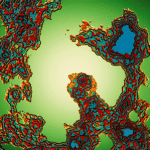Adenomyosis is a menstrual complication that causes heavier bleeding and pain during a woman’s period. About one in five women suffer from it.
As with most female diseases, it is poorly studied and consequently hard to treat. The endocannabinoid system (ECS) is known to be involved in reproductive tissues, and it is dysregulated in pathologies like endometriosis, so it makes sense to consider the ECS in this condition. A recent publication by Chinese scientists suggests that adenomyosis is associated with lower levels of cannabinoid receptors in uterine tissue. The researchers took tissue samples from 45 middle-aged women suffering from adenomyosis, as well as healthy controls. The two primary cannabinoid receptors, CB1 and CB2, were expressed at significantly lower levels in the group of women suffering from adeonmyosis. This alone doesn’t tell us whether the ECS is protective or harmful: Is the loss of cannabinoid activity contributing to the disorder? Or is the body suppressing the ECS to protect itself? We would need new experiments to answer these questions. But there’s reason to believe that the loss of CB1 would cause problems. CB1 levels normally fluctuate throughout the menstrual cycle, yet there was no discernible variation for women who had been diagnosed with adenomyosis. And the lower expression of CB2 could lead to greater inflammation and pain.
Adrian Devitt-Lee is a research scientist and longtime Project CBD contributor. © Copyright, Project CBD. May not be reprinted without permission.







